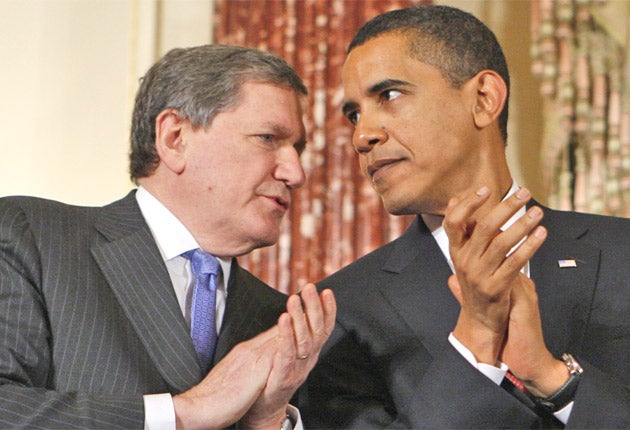Holbrooke's death leaves a hole in Afghan policy

Richard Holbrooke, the US special representative for Afghanistan and Pakistan, died late on Monday frustrated at his failure to make progress in ending the war in Afghanistan. He was 69 and his death in Washington came after 21 hours of surgery to repair a torn aorta.
Mr Holbrooke saw himself as playing a heroic role as envoy to Pakistan and Afghanistan where he hoped to repeat his success in 1995 when he oversaw the talks that ended the war in Bosnia. But, despite his energy and notorious combativeness, he was unable to forge a political strategy likely to bring peace.
President Obama said in praise of Mr Holbrooke that he was, "a true giant of American foreign policy who has made America stronger, safer and more respected. He was a truly unique figure who will be remembered for his tireless diplomacy, love of country, and pursuit of peace".
Yet in the two years since Mr Holbrooke took the job it had become well known among top officials in the White House that Mr Obama did not like him. This may have been partly because he owed his appointment to Secretary of State Hillary Clinton, who he served as foreign policy adviser during the 2008 presidential campaign. Had she won the White House he hoped to become Secretary of State.
"He's the most egotistical bastard I've ever met," the US Vice-President Joe Biden is quoted as saying to Mr Obama in Obama's Wars by Bob Woodward. "But maybe he's the right guy for the job."
Mr Woodward records that one of Mr Holbrooke's few successful interventions with Mr Obama was to get the President to call him "Richard" rather than "Dick", though Mr Obama said that he found the request peculiar.
Mr Holbrooke revelled in his reputation as a "bulldozer" and something of a bully, but in Afghanistan and Pakistan these qualities did not have as much impact as in the Balkans. American power post the Iraq war is also not what it was in the years immediately after the collapse of the Soviet Union.
Mr Holbrooke had been a member of the political elite for 40 years and served as a senior official in all Democratic administrations since the 1970s. Beginning as a field officer in Vietnam, the high point of his career was the Dayton Agreement when, over 20 days, he manoeuvred successfully between Serbian, Bosnian and Croatian leaders to end the war in the Balkans.
His inability to produce similar results in Afghanistan limited his influence in the White House where he was only one of a number of important players with input into Afghan policy. Mrs Clinton rebuffed efforts to sack him but the State Department as a whole has been increasingly marginalised by the US military in formulating policy. This has taken the form of relying on defeating, or at least seriously weakening, the Taliban in battle without developing a political strategy.
Mr Holbrooke was the only member of Mr Obama's team to have experience of the Vietnam War. This was hardly an analogy which the White House wanted to be reminded of, though he held that, unlike Vietnam, the Afghan war could be won. His remit covered more than diplomacy and included reorganising the US aid programme which is expensive and often ineffective.
A problem for Mr Holbrooke has been that in both Afghanistan and Pakistan he was dealing with political leaders with little power to deliver however much he tried to cajole them. The Afghan President Hamid Karzai appears to calculate that whatever the US says about him it cannot replace him. Mr Holbrooke clashed with him over fixing the presidential election in 2009 but only succeeded in permanently alienating the Afghan leader. Mr Karzai's message of condolence yesterday did not even mention that Mr Holbrooke had worked in Afghanistan.
According to cables from the US embassy in Islamabad leaked to WikiLeaks the Pakistan army shows no signs of abandoning its covert backing for the Taliban. Here again Mr Holbrooke's mission was undermined by the multitude of players on the US side.
If Mr Holbrooke has a successor he or she is also likely to be defeated by the lack of an effective US political strategy towards the Pakistan army, the Afghan government and the Taliban.
Subscribe to Independent Premium to bookmark this article
Want to bookmark your favourite articles and stories to read or reference later? Start your Independent Premium subscription today.

Join our commenting forum
Join thought-provoking conversations, follow other Independent readers and see their replies